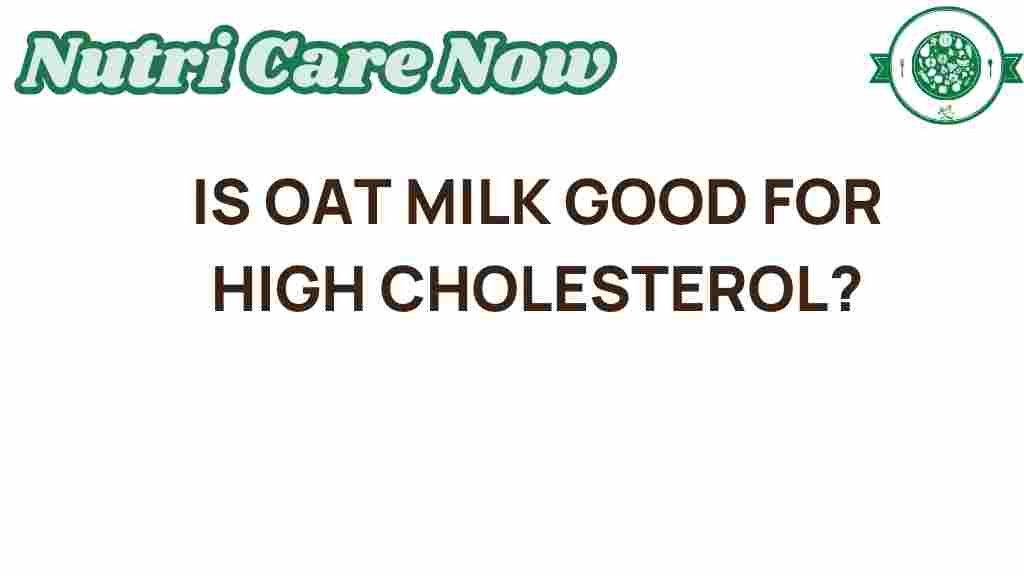Is Oat Milk the Secret Weapon Against High Cholesterol?
High cholesterol is a common health concern that affects millions of people worldwide. As we become more conscious of our dietary choices, many are turning to oat milk as a potential ally in the fight against high cholesterol. This article explores the health benefits of oat milk, its role in heart health, and how it fits into a plant-based diet.
Understanding High Cholesterol
Cholesterol is a waxy substance found in your blood, essential for building cells and producing certain hormones. However, too much cholesterol can lead to heart disease and other health issues. There are two main types of cholesterol:
- Low-Density Lipoprotein (LDL): Often referred to as “bad” cholesterol, high levels of LDL can lead to plaque buildup in arteries.
- High-Density Lipoprotein (HDL): Known as “good” cholesterol, HDL helps remove other forms of cholesterol from the bloodstream.
Maintaining a healthy balance between LDL and HDL is crucial for overall heart health. A diet rich in nutrition can help manage cholesterol levels effectively.
The Nutritional Power of Oat Milk
Oat milk is a popular dairy alternative made from whole oats and water. It has gained traction due to its creamy texture and naturally sweet flavor. But what makes oat milk a potential secret weapon against high cholesterol? Let’s delve into its nutritional profile.
- Beta-Glucans: Oat milk is rich in beta-glucans, a type of soluble fiber known for its cholesterol-lowering effects.
- Low in Saturated Fat: Unlike cow’s milk, oat milk contains minimal saturated fat, making it heart-healthy.
- Vitamins and Minerals: Oat milk is often fortified with essential nutrients, including calcium and vitamin D, which support overall health.
How Oat Milk Can Lower Cholesterol
Incorporating oat milk into your diet can contribute to cholesterol-lowering efforts in several ways:
- Reduces LDL Cholesterol: Studies have shown that the beta-glucans in oat milk can help lower LDL cholesterol levels by binding to cholesterol in the digestive system, promoting its excretion.
- Supports Heart Health: The antioxidants in oat milk, such as avenanthramides, may help reduce inflammation and improve blood vessel function.
- Weight Management: Oat milk can promote satiety due to its fiber content, helping with weight management—a crucial factor in controlling cholesterol levels.
Incorporating Oat Milk into Your Diet
Adding oat milk to your diet can be a delicious and easy way to support heart health. Here are some practical tips:
- Morning Smoothies: Blend oat milk with your favorite fruits and leafy greens for a nutritious breakfast.
- Coffee and Tea: Use oat milk as a creamy addition to your morning coffee or tea instead of traditional dairy.
- Baking: Substitute oat milk for cow’s milk in recipes for cakes, muffins, and pancakes.
- Soups and Sauces: Use oat milk as a base for creamy soups or sauces to enhance flavor without the saturated fat.
Potential Challenges and Troubleshooting Tips
While oat milk is a great addition to your diet, some may encounter challenges. Here are a few common issues and solutions:
- Texture Preferences: Some may find oat milk too thick. You can dilute it with water to achieve your desired consistency.
- Flavor Variations: If the flavor is too sweet or not to your liking, consider trying unsweetened or flavored varieties.
- Allergies: Those with gluten sensitivities should seek gluten-free labeled oat milk.
Scientific Evidence Supporting Oat Milk’s Benefits
Several studies have highlighted the cholesterol-lowering effects of oat milk. A meta-analysis published in the Journal of Nutrition found that the intake of beta-glucans significantly reduced total and LDL cholesterol levels. This evidence supports the notion that incorporating oat milk into a balanced diet can have profound benefits for heart health.
Comparing Oat Milk to Other Dairy Alternatives
With a wide variety of dairy alternatives available, it’s essential to compare their benefits:
- Almond Milk: Low in calories but may not provide the same cholesterol-lowering benefits as oat milk.
- Soy Milk: Contains protein and has been shown to lower cholesterol, but some may have soy allergies.
- Coconut Milk: High in saturated fat, which may raise cholesterol levels.
When it comes to heart health and cholesterol-lowering effects, oat milk stands out for its unique nutritional profile and health benefits.
Conclusion: The Role of Oat Milk in Heart Health
In conclusion, oat milk can be considered a secret weapon against high cholesterol, thanks to its rich content of beta-glucans and low saturated fat. By incorporating oat milk into a well-rounded plant-based diet, individuals can support their heart health while enjoying a delicious and versatile beverage.
As with any dietary change, it’s essential to consult with a healthcare professional, especially if you have existing health conditions related to cholesterol. The journey towards better heart health is a marathon, not a sprint, and small changes like adding oat milk can lead to significant improvements over time.
For more information on managing cholesterol through diet, check out our article on cholesterol management tips.
This article is in the category Health and created by NutriCareNow Team

1 thought on “Is Oat Milk the Secret Weapon Against High Cholesterol?”